Crypto Wallet Development: Types, Benefits, Cost & How to Build
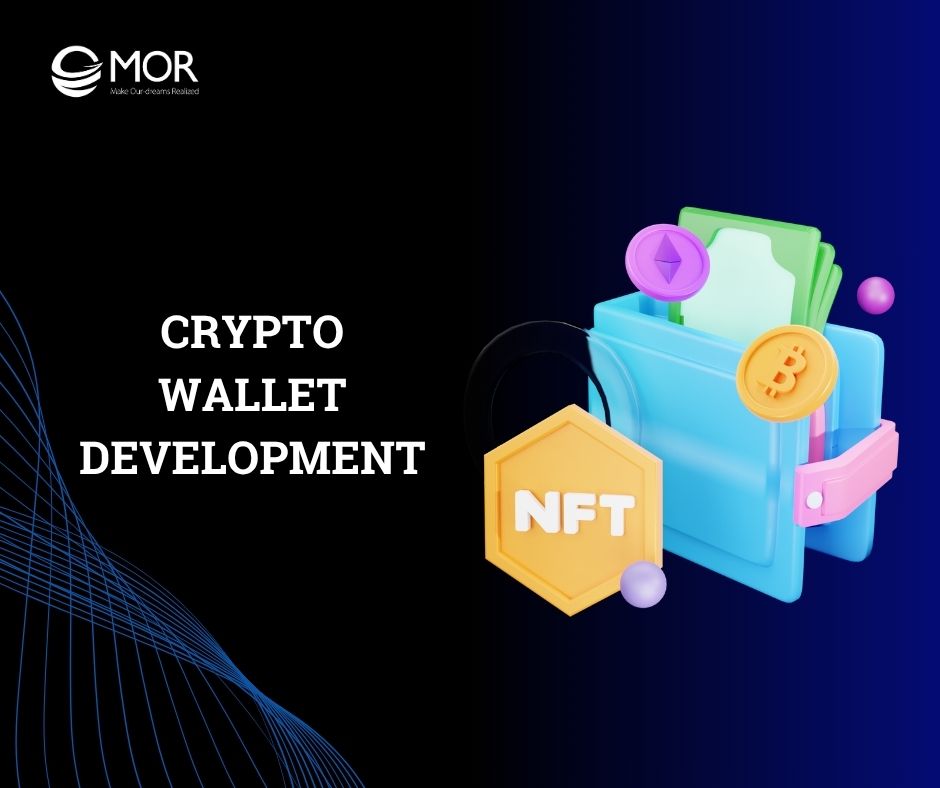
Is your business exploring crypto wallet development but unsure where to start? In today’s competitive blockchain landscape, owning a secure, scalable, and compliant crypto wallet is essential for long-term growth. This MOR Software's guide will break down the key considerations and step-by-step development process to help your business make decisions in building a crypto wallet.
Why Should You Invest In Crypto Wallet Development?
The world has witnessed a breakthrough in crypto wallet development between 2023 and 2024. According to a report:
- By 2024, there will be 562 million cryptocurrency owners worldwide, up 34% from 420 million in 2023.
- Among them, the total number of active crypto wallets surpassed 400 million, reflecting the growing interaction between users and blockchain platforms.
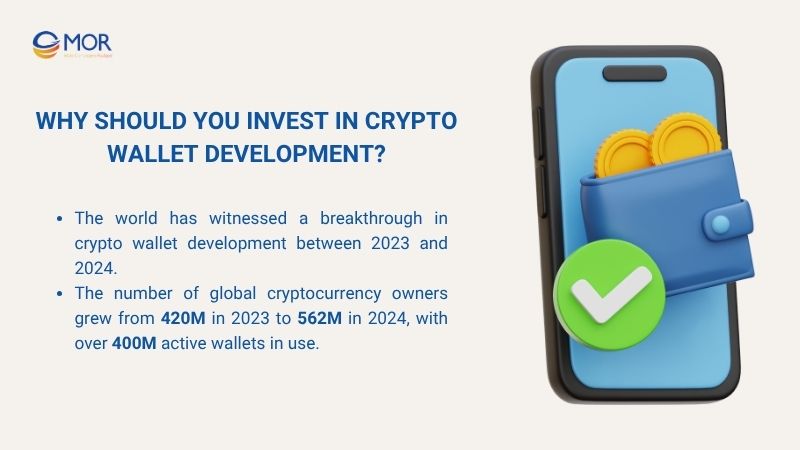
Today, crypto wallet development company play a strategic role in the blockchain ecosystem, serving as a central gateway for users to access DeFi, staking, NFTs, and decentralized applications (dApps). As a result, businesses are increasingly investing in blockchain wallet development, often partnering with a professional crypto wallet app development company to build secure, user-friendly, and fully integrated wallet solutions.
In parallel with the rising user base, security, and usability have become top priorities. Modern enterprises often opt for crypto wallet development as a fast and customizable approach to meet branding and compliance needs while reducing time-to-market.
Types Of Crypto Wallets Available On The Market Today
There are many types of crypto wallets available today, each offering different levels of accessibility, security, and use cases. This section will clarify and compare them so you can choose the best fit for your needs.
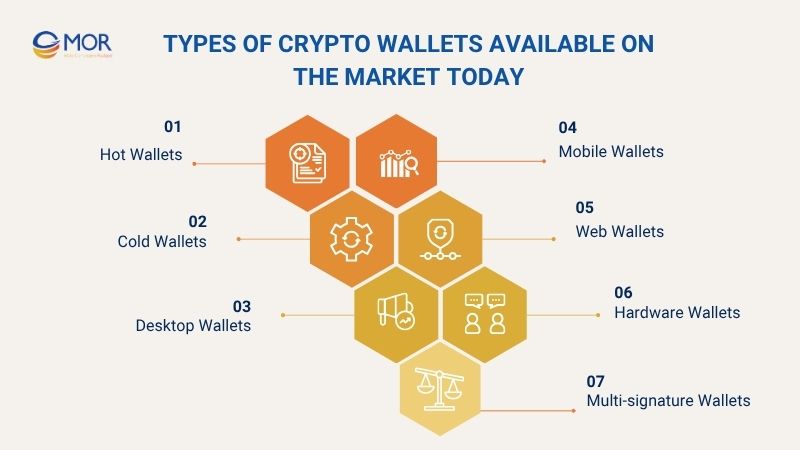
Hot Wallets
Hot wallets are cryptocurrency wallets directly connected to the internet, allowing users to perform transactions quickly and easily at any time. This is a popular choice for beginners in crypto or those who need to transact frequently.
However, since hot wallets are always online, they are more vulnerable to cyberattacks compared to cold wallets. Therefore, when businesses engage in cryptocurrency wallet development to build hot wallets, it is crucial to implement robust security measures.
Cold Wallets
In contrast to hot wallets, cold wallets are not directly connected to the internet. Instead, private keys and data are stored offline, typically in a physical device or on paper.
For businesses considering creating a crypto wallet with high-level security, cold wallets are an optimal solution. However, this type of wallet requires careful handling and places full responsibility on the user to manage their private keys.
Desktop Wallets
Desktop wallets are installed directly on a personal computer, allowing users to fully control their assets without relying on third parties. This type of wallet sits somewhere between hot and cold wallets, depending on how frequently the device connects to the internet.
Mobile Wallets
Mobile wallets are a form of hot wallet designed specifically for smartphones, enabling users to easily make payments and transfer coins while on the move.
Currently, many crypto token development companies are investing in crypto wallet development to build mobile wallets with beginner-friendly interfaces, QR code scanning, multi-chain support, and multi-asset compatibility.
Web Wallets
Web wallets can be accessed directly through a browser and are typically provided by exchanges or third-party platforms. Users only need to log in to manage and trade their assets without installing additional software.
While convenient, web wallets rely heavily on the service provider's servers, making them vulnerable if the platform is compromised.
Hardware Wallets
Hardware wallets are physical devices specifically designed to store private keys securely and entirely offline. They are among the most secure wallet types available today and are well-suited for long-term investors.
Multi-signature Wallets
Multi-signature wallets require a confirmation from multiple parties to authorize a transaction. This is a common solution for investment groups, DAOs, or organizations seeking enhanced transparency and internal control. Modern crypto wallet development platforms often offer multi-signature functionality as an advanced security option.
Wallet Type | Setup Complexity | Backup Method | Ideal For | Upgradability | Risk if Device Lost |
Hot Wallet | Very easy | Cloud or seed phrase | Beginners, frequent traders | High | Medium (recoverable with seed) |
Cold Wallet | Moderate to hard | Offline (paper or hardware) | Long-term holders | Low | High if not backed up |
Desktop Wallet | Moderate | Local file + optional seed phrase | Tech-savvy users | Medium | Medium to high |
Mobile Wallet | Easy | Cloud sync or seed phrase | Mobile-first users | High | Medium |
Web Wallet | Very easy | Managed by service provider | Users who need quick access | High | High if no 2FA or backup |
Hardware Wallet | Moderate | Device + seed phrase | Institutional or long-term holders | Low (only firmware updates) | Very high if no backup |
Multi-signature Wallet | Moderate to complex | Shared key access + seed backups | DAOs, teams, collaborative wallets | Medium to high | Low (due to shared access control) |
Benefits Of Using Crypto Wallet Development
Choosing crypto wallet development gives businesses a competitive edge in the growing blockchain ecosystem. This section outlines key advantages that make crypto wallet development a smart investment for forward-thinking businesses.
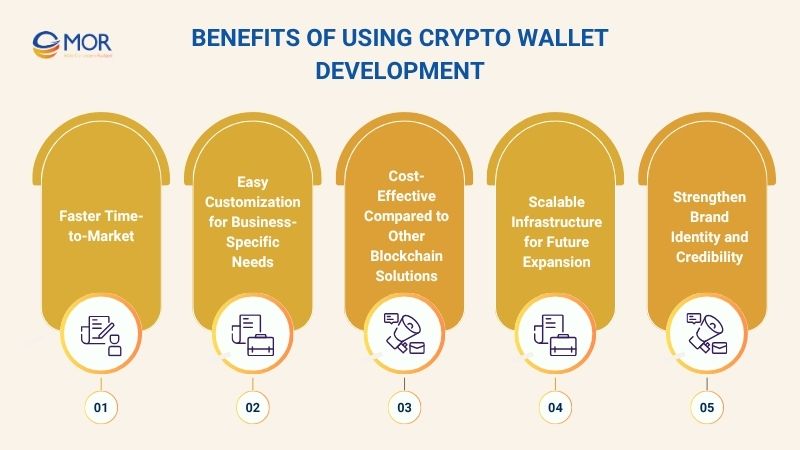
Faster Time-to-Market
In the highly competitive enterprise blockchain landscape, speed-to-market is a critical advantage. Choosing crypto wallet development allows businesses to significantly reduce the time required to launch a wallet product.
Instead of building from scratch, development teams can leverage optimized and pre-tested wallet solutions. ScienceSoft (EU) helped the Secure‑DeFi project complete its crypto wallet design, technical documentation, and development roadmap in just 4 weeks. In contrast, building a wallet from scratch typically takes 6 to 12 months.
Easy Customization for Business-Specific Needs
One of the key advantages of white label crypto wallet development is its flexibility to adapt to a business’s unique brand identity and functional requirements. Companies can customize the interface, integrate preferred blockchain networks, and add tailored features such as staking, NFTs, and multi-chain support.
Example:
A digital travel platform called TravelGo wanted to launch its crypto wallet to support its token-based loyalty and cashback program. However, they needed more than just a standard crypto wallet.
Through a white label wallet development solution, they requested highly specific customizations such as:
- Integration with their travel booking system, allowing users to redeem tokens for flights and hotel reservations directly within the wallet interface.
- Connection to their CRM, enabling automatic member tier classification and personalized offers based on travel history.
- A travel-themed UI featuring an interactive map to visualize countries the user has “visited” by spending tokens.
Cost-Effective Compared to Other Blockchain Solutions
Developing a crypto wallet is more cost-effective than building a decentralized application (dApp). By partnering with a crypto wallet development company, businesses can reduce internal development overhead, avoid costly infrastructure decisions, and streamline the process using tried-and-tested technologies.
According to Coinbound, the cost of developing a crypto wallet ranges from $25,000 to $150,000, depending on its complexity. In contrast, building a decentralized application (dApp) is significantly more expensive, typically ranging from $45,000 to $300,000 or more
Scalable Infrastructure for Future Expansion
Crypto wallet applications must support current requirements and future growth. Modern crypto wallet app development approaches focus on scalability by using cloud-native infrastructure and modular architecture. As a result, businesses can adapt and scale efficiently without having to completely rebuild their wallet system later.
Strengthen Brand Identity and Credibility
Building a custom crypto wallet isn’t just about functionality. It’s about branding and trust. When companies create crypto wallets tailored to their visual identity and technical goals, they show commitment to innovation and user satisfaction.
A branded wallet differentiates the product in a saturated market, boosts user loyalty, and builds credibility by demonstrating ownership of both the technology and user experience.
>>> Discover more topics about Blockhain on MOR Blog today!
A Step-by-Step Guide To Create A Crypto Wallet Development
To ensure robust security, scalability, and an optimal user experience, businesses must follow a well-structured process. The section below outlines each critical step involved in a professional and efficient crypto wallet development journey.
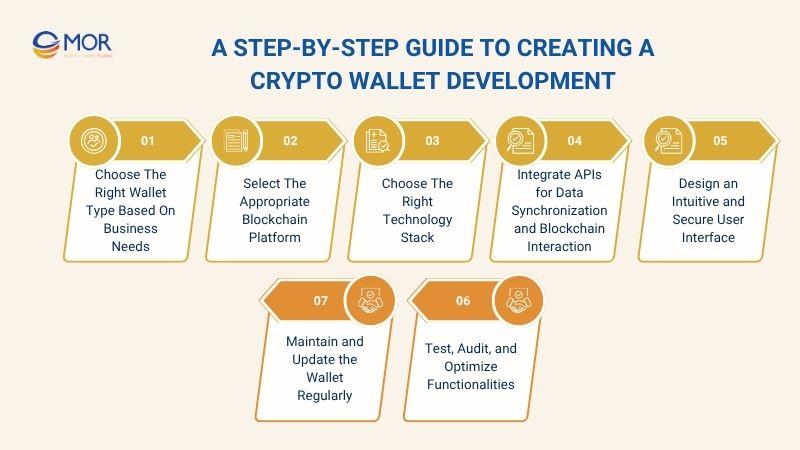
Choose The Right Wallet Type Based On Business Needs
To begin, businesses must identify the most suitable wallet type aligned with their goals and user behavior. Hot wallets, cold wallets, mobile wallets, or multi-signature wallets each offer distinct advantages and trade-offs.
For instance, mobile or web wallets are ideal for end-user-focused applications that prioritize ease of use. Meanwhile, organizations that prioritize security should consider cold wallets or multi-signature wallets.
Select The Appropriate Blockchain Platform
Each blockchain platform offers different ecosystems and levels of developer support. This step is crucial, as it directly impacts the wallet’s performance, scalability, and future interoperability.
Instead of simply choosing the most popular chain, businesses need to evaluate transaction speed, fees, smart contract support, and ecosystem maturity to ensure long-term viability. A trusted crypto wallet development company can provide technical consultation and recommend the best-fit blockchain based on your use case.
Choose The Right Technology Stack
The technology stack has a direct impact on the wallet’s performance, stability, and scalability. Typically, a full crypto wallet development project requires a combination of:
- Frontend: React Native (mobile), Vue.js, Next.js
- Backend: Node.js, Python, Go
- Database: PostgreSQL, MongoDB
- Security: OpenSSL, JWT, Hashing Libraries
- Blockchain integration: Web3.js, Ethers.js, or gRPC for private chains
An experienced crypto wallet development company will help determine the optimal stack that balances performance and long-term maintenance costs.
Integrate APIs for Data Synchronization and Blockchain Interaction
API integration is essential for ensuring smooth wallet operation and real-time connectivity to the blockchain. Common APIs include:
- Blockchain Node API – for fetching block data and submitting transactions
- Price Feed API – for syncing token prices in real time
- KYC/AML API – for user identity verification
- Notification API – for alerting users of transaction activity
A modern crypto wallet development approach should adopt an open architecture to enable easy API integration or replacement as the product evolves.
Design an Intuitive and Secure User Interface
UI/UX plays a critical role in user retention. A wallet must offer a user-friendly interface, support multiple languages, and ensure easy navigation even for beginners.
At the same time, security cannot be overlooked in the UI: password setup, two-factor authentication, and suspicious transaction alerts should all be part of the interface logic. Businesses that work with white label crypto wallet development providers often gain access to pre-optimized interface templates, accelerating launch timelines without sacrificing usability.
Test, Audit, and Optimize Functionalities
Before launch, the entire system must undergo a rigorous testing and auditing process, including functional testing, security audits, and performance (load/stress) testing. For crypto wallets, special attention must be paid to:
- Private key management
- Handling multiple simultaneous transactions
- Resilience against unstable networks, API failures, or abnormal data inputs
Many businesses choose to outsource this phase to experienced crypto wallet development companies to ensure the wallet meets international security standards.
Maintain and Update the Wallet Regularly
Blockchain as a service is a fast-evolving ecosystem. Maintaining a wallet goes beyond fixing bugs; it includes protocol upgrades, improved security, support for new tokens, and UX updates based on user feedback.
White label crypto wallet solutions typically offer a regular update roadmap, allowing businesses to maintain performance and compatibility without expanding their in-house development team.
Key Considerations When Building A Crypto Wallet Development
Developing a crypto wallet is not just a technical task; it also involves ensuring scalability, security, and regulatory compliance. This section outlines the key factors businesses should consider to build a stable, secure, and user-friendly wallet solution.
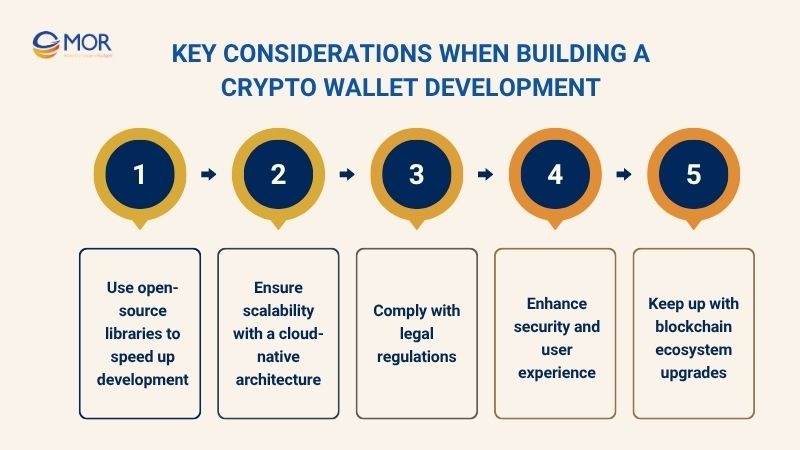
Use open-source libraries to speed up development
During the crypto wallet development process, leveraging open-source libraries accelerates development and serves as a cost-effective and security-standardized strategy. However, not every library suits the product direction or technical goals.
Specific examples:
- Ethers.js is ideal when building an Ethereum wallet with lightweight browser performance in mind.
- BitcoinJS-Lib is the standard choice for single-chain Bitcoin wallets that require high signature processing accuracy.
- WalletConnect SDK can be integrated if the wallet is expected to support dApp communication via QR code.
However, businesses should avoid "randomly patching" libraries together, as incompatibilities in encryption logic, signature standards (ECDSA, Schnorr…), or version updates may cause system-level errors.
Ensure scalability with a cloud-native architecture
Scalability is a vital factor in crypto wallet development, especially when user volume can surge rapidly in response to market trends. Instead of relying on traditional server models prone to overload, businesses should adopt cloud-native architecture, a modern approach.
Example: Suppose a startup in Southeast Asia is building a crypto wallet for 500,000 users. During peak periods, traffic spikes 3x in just a few days.
- If the system uses traditional server architecture, it could easily overload, resulting in lag, downtime, and severe damage to user experience and brand trust.
- If the system is built with cloud-native architecture (using containers, microservices, and auto-scaling), it can automatically allocate resources based on demand, ensuring stable performance even during transaction surges.
Comply with legal regulations
Crypto wallet development cannot be separated from legal compliance—especially when targeting major markets like the US, EU, or Singapore. In 2024, the total global penalties related to crypto regulation violations reached $5.1 billion, with the UK’s FCA alone issuing fines totaling £500 million (~ USD 615 million).
Therefore, compliance is mandatory for businesses aiming to operate sustainably and earn user trust. From the initial phase, companies must clearly define standards related to KYC (Know Your Customer), AML (Anti-Money Laundering), and user data protection in line with frameworks like GDPR or CCPA.
Enhance security and user experience
One of the biggest challenges in crypto wallet development is balancing strong security with user convenience. A good user experience should not come at the cost of eliminating critical protective layers.
Professional crypto wallet development companies often offer optimized UI/UX libraries tailored for common behaviors such as transferring funds, token storage, or interacting with dApps. This enables businesses to deploy wallets quickly without compromising experience standards.
Keep up with blockchain ecosystem upgrades
Smart contract blockchain technology evolves continuously. Ethereum may fork, Solana might enhance performance, or new token standards could emerge that require wallet support. If the wallet isn't regularly updated, users may face transaction errors, broken RPC connections, or inability to access new assets.
To prevent this, a crypto wallet system should be built with an open architecture, capable of fast API version updates, adding new chains without having to rewrite the entire backend. In addition, the development team should regularly monitor the roadmaps of major blockchains to plan timely adjustments.
Factors That Affect Crypto Wallet Development Cost
The cost of developing a crypto wallet does not have a fixed number; it varies depending on several key factors. In this section, we’ll break down each element that directly influences the crypto wallet development cost.
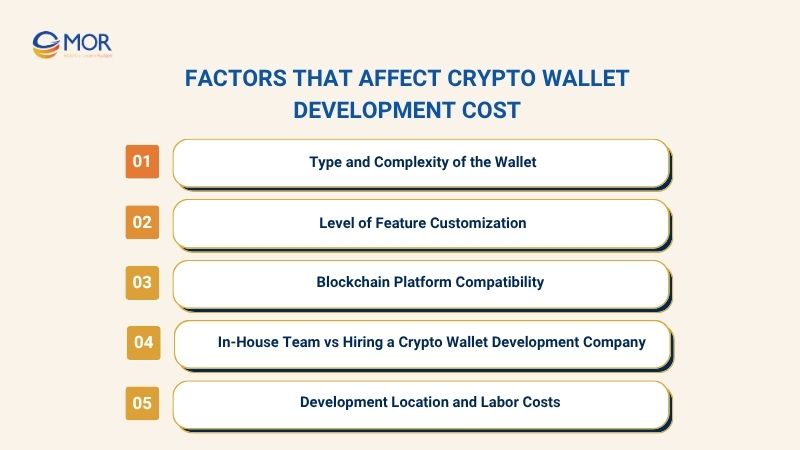
Type and Complexity of the Wallet
One of the most significant factors impacting crypto wallet development cost is the type of wallet and the level of technical complexity involved.
Wallet Type | Estimated Cost (USD) |
Hot Wallet (Mobile/Web) | $25,000 – $60,000 |
Cold Wallet (Hardware/Offline) | $80,000 – $150,000 |
Multi-signature or Multi-chain Wallet | $120,000 – $200,000+ |
Level of Feature Customization
The more customized your wallet features are, the higher the crypto wallet development cost will be. Basic wallets with standard functions like token transfers and balance display are quicker and cheaper to build.
In contrast, if your wallet requires:
- Advanced security protocols (e.g., biometric authentication, role-based access)
- Custom UI/UX flows
- Real-time analytics dashboards
You’ll likely incur additional costs for frontend, backend, and testing.
Fully customized wallets can cost 1.5–2x more than white-label or off-the-shelf solutions. The more tailored the user experience and security layers, the more time and budget your team will need.
Blockchain Platform Compatibility
Supporting multiple blockchain platforms directly increases crypto wallet development cost. A single-chain wallet (e.g., Ethereum-only) is easier to implement using established tools like Web3.js or Ethers.js.
However, if you're building a multi-chain crypto wallet, you must account for:
- Integration with multiple RPC nodes
- Token standard differences (ERC-20, SPL, BEP-20, etc.)
- Separate signing and transaction logic
Each additional chain adds layers of development, testing, and ongoing maintenance—especially when networks undergo updates or forks.
In-House Team vs Hiring a Crypto Wallet Development Company
Your approach to development significantly impacts overall costs. Businesses generally choose between:
- In-house development: Offers full control but requires long-term investment in skilled blockchain developers, ongoing training, and infrastructure.
- Hiring a crypto wallet development company: Enables faster go-to-market, proven workflows, and access to specialized expertise. While the initial cost may be higher, it often results in reduced risk and fewer delays.
Many startups opt for a hybrid model: outsourcing the MVP to reduce time-to-market, then shifting to in-house development for scaling and customization.
Development Location and Labor Costs
The geographical location of your development team can drastically affect the crypto wallet development cost. Hourly rates vary by region:
Region | Average Hourly Rate (USD) |
North America | $100 – $200 |
Western Europe | $80 – $150 |
Eastern Europe | $40 – $80 |
Southeast Asia | $25 – $60 |
For example, a 4-month crypto wallet project with 5 full-time developers in the U.S. could exceed $250,000, while the same scope in Southeast Asia might range between $80,000 – $120,000.
Many companies choose offshore crypto wallet development partners in Asia or Eastern Europe to optimize quality while lowering expenses.
In Conclusion
As the blockchain continues to evolve, businesses aiming for long-term success must lay a solid technological foundation from the start. Investing in a well-structured crypto wallet development solution helps reduce operational costs and enhances the overall user experience. Contact us today to get expert consultation on the right crypto wallet development solution for your business growth objectives!
Rate this article
0
over 5.0 based on 0 reviews
Your rating on this news:
Name
*Email
*Write your comment
*Send your comment
1